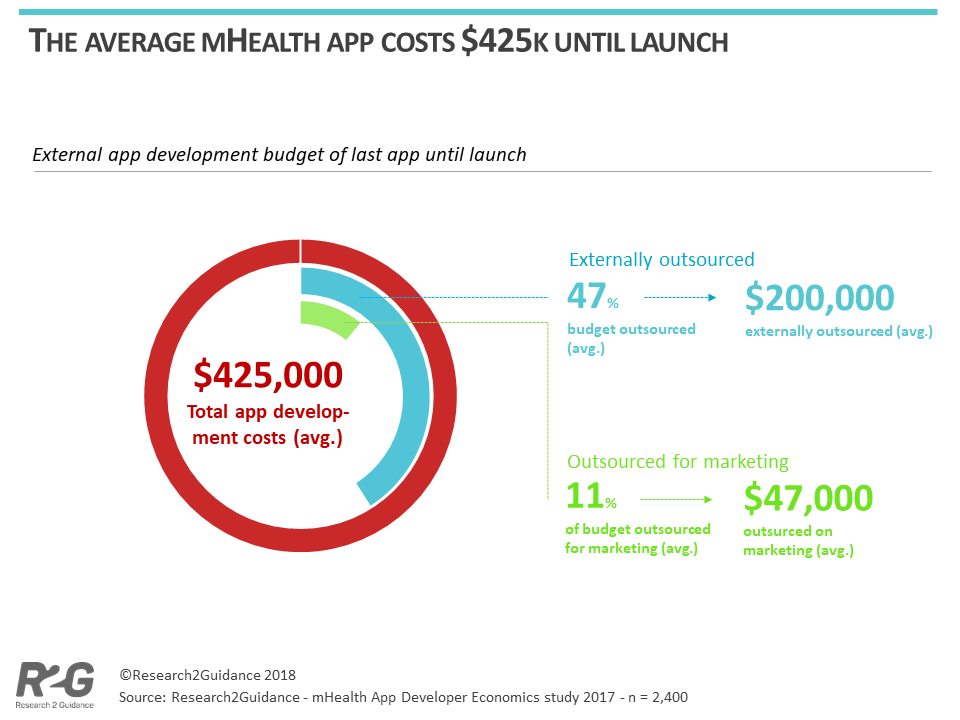
Today the average mobile health app costs $425,000 to develop until launch including internal and external development costs as well as marketing costs, according to a recent Research2Guidance report. The report, “mHealth Economics – How mHealth App Publishers Are Monetizing Their Apps” reveals the cost of developing mobile health apps has significantly increased over the last few years with the typical project size ranging from $30k-40k to now ballooning up to several million for top apps. In addition, EHR integration is the biggest driver of development costs for a mobile health app, representing approximately two thirds of the costs.
Outsourcing Mobile Health App Development
Almost half (47%) of total development costs are outsourced to e.g. third-party app development agencies or freelancers, translating to costs of $200,000. 11%, or $47,000, of the total budget is spent on marketing. Companies that outsource more than average of their development budget are ‘Pharma companies’ and ‘mHealth app companies’. Those companies outsource 80% or more of their external development budget.
Further key findings of ‘outsourcers’ reveals:
– Companies with a higher budget are outsourcing more of their budget. The more money a company has allocated for development, the more money will be outsourced.
– Big companies are outsourcing more of their budget than small companies. Corporations with more than 5,000 employees are outsourcing above average of their development budget.
– Companies with the business model “transaction” (e.g. selling drugs, selling devices) are outsourcing more of their budget, which again hints to pharma companies.
– Companies that outsource a lot on development also outsource more of their external budget on marketing. And speaking of marketing: Their preferred marketing channels differ from the average: They are relying more on social media and influencer marketing.
Other key findings from the report include:
Monetizing Mobile Health Apps
– Currently, 56% of mHealth app publishers make between $0- $10,000/year with their entire mHealth app service portfolio.
– The most common business models6in mobile healthcare consist of licensing(35%), service sales (26%) , app development for 3rd parties (25%), and sponsorship9 (24%).
– Compared to the previous year, certain business models became more popular among mHealth app publishers. This mainly includes licensing of the app, dashboard, device or service to clients, as well as transaction business models (e.g. device/medication selling via the app).
– fewer companies reported 3 rd party app development and paid downloads as their main source of revenue.
– ‘Device sales’ is the business model with the highest share of revenue millionaires (23%), whereas ‘premium content’ is the business model with the lowest percentage of revenue millionaires (5%).
Mobile Health App Development Timeline
– On average, the time needed to develop a mobile health app is 15 months
– 24% of projects are reported to be launched in a maximum time frame of six months.
– One fourth of the market is practicing agile/rapid development practices! 56% of apps are developed within one year until launch. 17% of all mHealth app publishers report a development time of more than 2 years.
– On average, companies with a short development cycle come from Europe, are smaller in size, and have small external budgets. Companies with longer app development cycles tend to come from North America, have a higher external budget and, no surprise, are larger in size.
For more information about the report, visit https://research2guidance.com/product/mhealth-economics-how-mhealth-app-publishers-are-monetizing-their-apps/
